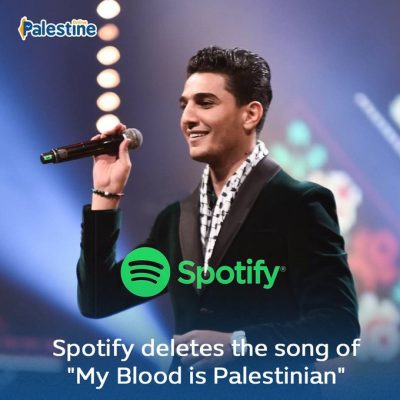Palestinian Singer Mohammed Assaf’s Patriotic Song Removed from Spotify, Apple Music
Assaf told The New Arab's Arabic-language site that he received an email from Spotify saying his song "Ana Dammi Falastini" was removed under the pretence of "inciting against Israel."

All Global Research articles can be read in 51 languages by activating the Translate Website button below the author’s name.
To receive Global Research’s Daily Newsletter (selected articles), click here.
Click the share button above to email/forward this article to your friends and colleagues. Follow us on Instagram and Twitter and subscribe to our Telegram Channel. Feel free to repost and share widely Global Research articles.
***
Palestinian song “Ana Dammi Falastini” (My Blood is Palestinian) by Palestinian singer Mohammed Assaf has been removed from music streaming services Spotify and Apple Music over allegations it “incites against Israel”.
Assaf said he felt “shocked” that his signature song was taken down from the widely-used streaming services in a statement on Sunday to Al-Araby Al-Jadeed, The New Arab’s Arabic sister site.
“I checked my official page on the Spotify and Apple Music platforms, and was surprised that the song ‘Ana Dammi Falastini’ was deleted,” he said.
“I received an official email about it, on the pretext that the song incites the Zionist enemy, which makes me more honored that my songs express the Palestinian people’s resistance to the occupation,” he continued.
The song, released in 2015, which translates to “My Blood is Palestinian”, is widely regarded as a patriotic Palestinian song that is often played or sung in events marking Palestinian culture.
The 33-year-old singer, who is from the besieged Gaza Strip, derided the claim, saying: “This accusation increases my honour and belonging to my homeland, Palestine and my just cause,” and that “even if they delete this song, it is present in the memory and conscience of every Palestinian and every honourable free man who defends the right of the Palestinian people to obtain their freedom and independence.”
The Dubai-based singer added that the removal indicates “their hostility to freedom and justice, and to the Palestinians cause.”
Spotify denied that it had removed the music from the music platform.
“Spotify aims to offer a wide range of music on our platform, but availability may vary over time and by country,” it said in a statement.
“The removal of some of Mohammed Assaf’s content was not determined by Spotify, but rather by the distributor. We anticipate its return in the near future and apologize for any inconvenience caused.”
The New Arab has contacted MBC for comment on claims that Assaf’s label Platinum Records, which is owned by the entertainment giant, pulled the song.
The removal of Assaf’s anthem has sparked outrage among Palestinian activists on social media, who called the streaming platform “shameless and spineless.”
One user, Hamza, said stressed that the song “doesn’t even mention Israel and is just about Palestinian identity and heritage – yet is somehow still seen as a problem?”.
This isn’t the first time that the Palestinian singer has been on the receiving end of hostility. In 2020, a member of the Israeli Likud party, sought to prohibit Assaf from entering the occupied Palestinian territories.
Spotify, a digital music streaming service, has reportedly deleted the famous Palestinian song 'My Blood is Palestinian' by Mohammed Assaf from its platform. pic.twitter.com/UO4oIHSbMC
— PALESTINE ONLINE 🇵🇸 (@OnlinePalEng) May 21, 2023
Avi Dichter said that a special permit – usually issued to Gazans allowing them to enter the occupied West Bank – would be withdrawn.
Assaf, who grew up in the Khan Younis refugee camp, is a widely popular singer in the Middle East and North Africa, having won the second season of the singing competition show ‘Arab Idol’ in 2013.
The Gazan’s win was widely celebrated in the region and was deemed significant due to his Palestinian heritage.
Following his win, Assaf was named ambassador of peace by the United Nations Relief and Works Agency for Palestinian Refugees (UNRWA).
*
Note to readers: Please click the share button above. Follow us on Instagram and Twitter and subscribe to our Telegram Channel. Feel free to repost and share widely Global Research articles.
Featured image is from @OnlinePalEng/Twitter

